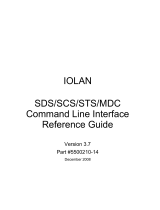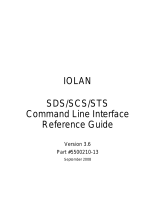
21
Modbus Commands
Modbus Commands
Set Modbus Gateway
Description Sets the Modbus parameters for the IOLAN when it is operating as a Modbus Gateway.
User Level Admin
Syntax
set modbus gateway [addr-mode embedded|re-mapped]
set modbus gateway [broadcast on|off]
set modbus gateway [char-timeout <number>]
set modbus gateway [next-req-delay <number>]
set modbus gateway [exceptions on|off]
set modbus gateway [idle-timer <number>]
set modbus gateway [mess-timeout <number>]
set modbus gateway [port <TCP/UDP_port>]
set modbus gateway [req-queuing on|off]
set modbus gateway [remapped-id <1-247>]
set modbus gateway [ip-aliasing on|off]
Options addr-mode
Determines if the original UID address will be embedded in the transmission header or
if a specified (remapped) UID will be embedded in the transmission header.
broadcast
When enabled, a UID of 0 (zero) indicates that the message will be broadcast to all
Modbus Slaves. The default is
Off.
char-timeout
Used in conjunction with the Modbus RTU protocol, specifies how long to wait, in
milliseconds, after a character to determine the end of frame. The default is 30 ms.
next-req-delay
A delay, in milliseconds, to allow serial slave(s) to re-enable receivers before issuing
next Modbus Master request. The default is 50 ms.
exceptions
When enabled, an exception message is generated and sent to the initiating Modbus
device when any of the following conditions are encountered: there is an invalid UID,
the UID is not configured in the Gateway, there is no free network connection, there is
an invalid message, or the target device is not answering the connection attempt. The
default is On.
idle-timer
Specifies the number of seconds that must elapse without any network or serial traffic
before a connection is dropped. If this parameter is set to 0 (zero), a connection will not
be dropped (with the following exceptions: the TCP KeepAlive causes the connection
to be dropped or the Modbus device drops the connection). The default is 10 seconds.
mess-timeout
Time to wait, in milliseconds, for a response message from a Modbus TCP or serial
slave (depending if the Modbus Gateway is a Master Gateway or Slave Gateway,
respectively) before sending a Modbus exception. The default is 1000 ms.
port
The network port number that the Slave Gateway will listen on for both TCP and UDP
messages. The default is 502.



























